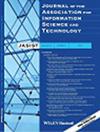Inhibitors to the Electronic Teaching and Learning of Library Science in the Nigerian Universities of the Post-COVID-19 Pandemic Era and the Way Forward
Journal of the American Society for Information Science and Technology
Pub Date : 2021-05-31
DOI:10.11648/j.ajist.20210502.13
引用次数: 2
Abstract
This is a review of the extant literature on inhibitors to the electronic teaching and learning of Library and Information Science (LIS) in Nigerian universities. The university-wide inhibitors as identified by the study are non-provision or inadequacy of: funding, administrative and infrastructural supports, functional ICT laboratories/tools, ICT-compliant teaching staff and standby and responsive technical support for both teachers and students. Library schools’ inhibitors include poor maintenance culture, lack of Internet presence, dedicated bandwidth and active websites while the teaching and learning inhibitors highlighted by the study are (older) teachers’ poor attitude, concerns on how to retain the copyright of their lecture contents, plagiarism and the quality of students’ work; fear of additional workload which may result in stress and burnt-out; lack of freedom or teaching autonomy (as teaching may now take the collaborations of colleagues, computer experts and instructional/graphic designers); teachers’/students’ poor expertise and technology background and nature of course, among others. The author made suggestions on the way forward for an increased and a sustainable integration of ICTs in teaching and learning, especially in this Post-COVID-19 Pandemic Era where physical contact and interactions may need to be reduced to the barest minimum to contain contagious communication and consequent health hazards. This review has implications for library educators, students and educational managers in the universities of other developing countries.后covid -19大流行时代尼日利亚大学图书馆学电子教学的阻碍因素及前进方向
本文对尼日利亚大学图书馆与情报学(LIS)电子教学的阻碍因素进行了综述。该研究确定的全校范围的阻碍因素是:资金、行政和基础设施支持、功能ICT实验室/工具、符合ICT标准的教学人员以及对教师和学生的备用和响应性技术支持不提供或不足。图书馆学校的阻碍因素包括维护文化差,缺乏互联网存在,专用带宽和活跃的网站,而研究强调的教学和学习阻碍因素是(年长)教师态度差,关心如何保留其讲座内容的版权,抄袭和学生的工作质量;担心额外的工作量可能会导致压力和倦怠;缺乏自由或教学自主权(因为教学现在可能需要同事、计算机专家和教学/图形设计师的合作);教师/学生的专业知识和技术背景差,当然还有性质等等。作者就如何进一步和可持续地将信息通信技术融入教学和学习提出了建议,特别是在covid -19大流行后的时代,可能需要将身体接触和互动减少到最低限度,以遏制传染性传播和由此产生的健康危害。本文对其他发展中国家的大学图书馆工作者、学生和教育管理者具有一定的启示意义。
本文章由计算机程序翻译,如有差异,请以英文原文为准。
求助全文
约1分钟内获得全文
求助全文
来源期刊
自引率
0.00%
发文量
0
审稿时长
3.5 months

 求助内容:
求助内容: 应助结果提醒方式:
应助结果提醒方式:


